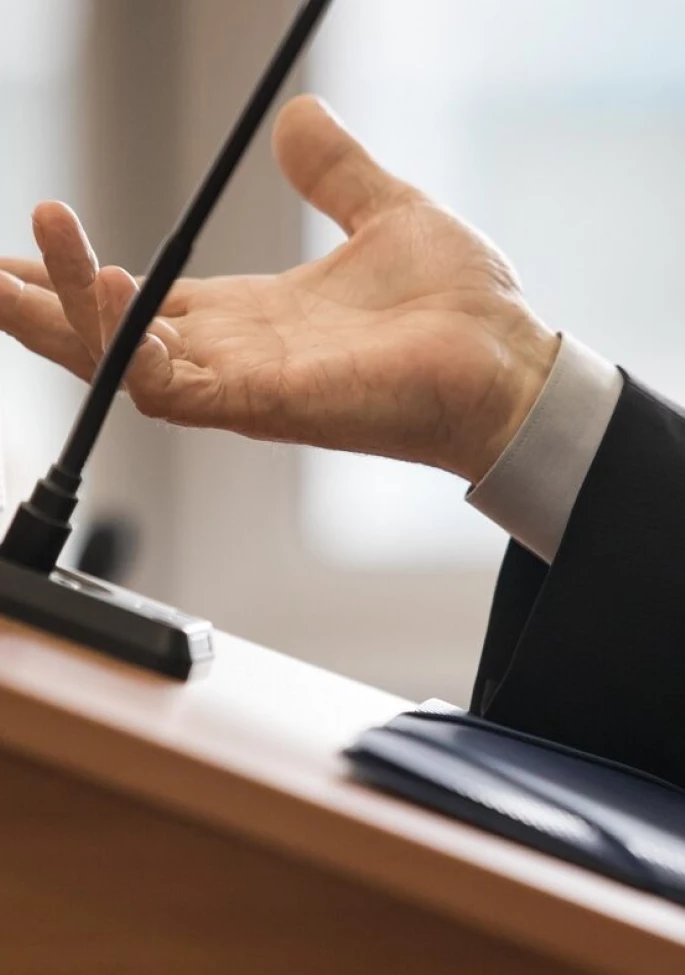In a recent set of post-trial juror interviews, the jurors we spoke to detailed how the believability of the plaintiff’s expert witness had them strongly favoring the plaintiff—that is, until the defense attorney caused the expert to fall apart on cross-examination. They described the experience of watching this attorney dismantle the witness as akin to being in court with Perry Mason, and they had referred to the attorney by that very name for the rest of trial.
The plaintiff expert’s inability to remain consistent through cross-examination was beneficial to our case. Yet it also highlighted the dangers of being on the wrong side of such a drastic shift in jurors’ opinions. We don’t want our experts to fold on cross in the same way, and we don’t want our opponent to be the one celebrating as our case sinks.
So, it’s important to examine what qualities can make for a successful expert witness, what tends to go wrong for experts on the stand, and how we can help our witnesses avoid traps on cross and maintain clear, convincing testimony. Here are some key things to keep in mind, based on 25+ years of preparing expert witnesses:
Top Expert Witness Qualities to Look For
- An ability to remain calm, steady, and professional in the face of cross-examination. Cross is when many experts, regardless of their pedigrees or knowledge, tend to lose credibility with jurors because they falter. Their faltering styles can take several forms (as we list in the section below).
- An ability to handle cross-examination smoothly and to professionally disagree without being combative or condescending. An expert witness should be able to stand their ground and disagree with opposing counsel’s spin, but know when to take a pass neutrally without the need to get a few “digs” in.
- Similarly, an ability to identify and then exploit the plaintiff’s vulnerable points, without appearing to be an advocate (read: mouthpiece) for the defense. Even though many experts’ instinct is to attempt to discredit every individual study or example proffered by plaintiff’s counsel, it is more effective to subtly imply the plaintiff’s studies or examples were all bad, in a non-hostile way and without condescension.
An example of the latter would be if the expert fights back on, perhaps, every fourth issue the plaintiff’s counsel raises. They can then say, “You know, I bit my tongue on the other studies you brought up, but I just can’t do the same for this one because it has too many flaws.” This offers an opportunity for the expert to go into more detail on a vulnerable point for the plaintiff, exposing flaws while at the same time casting doubt on the other studies the plaintiff raised that were not as easy to attack.
What Jurors Will Remember About Your Expert Witness
1. When the expert witness changes demeanor between direct and cross
There are a number of ways witnesses often erode their own credibility on cross, including:
- Being overly combative
- Seeming defensive or angry
- Lacking (or appearing to lack) knowledge about his/her area of expertise
- Appearing anxious, skittish, jumpy, etc. – and especially anything that contrasts with their behavior during direct
- Buckling under pressure from the plaintiff attorney
- Giving contradictory answers
2. When the expert testifies full-time, and it shows
Jurors can sense “canned” testimony that travels from case to case. They’re way more likely to remember and believe testimony when it’s customized to the exact issues in the case at hand, rather than a set of stock answers.
3. What they write down in their notebooks; and if it’s not in there, whatever bits are easiest to recall
Because jurors don’t always recall details of the testimony, it is best to prioritize credibility over pedigree when choosing an expert witness; a Harvard PhD who can’t hold up to cross-examination is less credible than one from Michigan State who can glide through both sides’ questioning without being combative or losing his cool. Jurors will certainly remember whether they believed your expert or not.
4. Approachable language and numbers
The less quantitative and statistical the expert witness is, the better. Normal humans don’t communicate in p-values and statistical significance, nor do they communicate in percentages. Another problem with communication via statistical jargon is that, in many of these studies, the sample sizes are so small they leave huge confidence intervals that are essentially meaningless to jurors in terms of using them as evidence for or against a point. They ask us, “What does that have to do with this plaintiff?”
So, if the expert delivers their message in simple, approachable terms, your chances are better that the testimony will be recorded in at least one juror’s notebook. They will write down what they understand.
5. Field studies and applied research
(As opposed to theories or animal/rat studies, which jurors have difficulty relating to the human case in front of them.)
6. Physical models and real results from the plaintiff’s exam, harm, or claim
(If available or relevant—e.g., actual x-rays, vehicle models, etc.)
Actual models used in testimony to help explain disease and physical functions, or test results that show a product was not defective, are easier to understand and more engaging for jurors. Granted, while raw data or imaging (especially scientific, medical, or financial) will often be confusing without annotations and modifications, the key is to find a balance that still centers on authentic and case-specific (rather than generic) information.
Final Thoughts
From interviewing prospective expert witnesses properly, to selecting the right ones, to preparing them to incorporate your case themes and communicate with layman jurors, there’s a lot that goes into maximizing your experts’ effectiveness on the stand. We hope you’ve found these tips to be a helpful start.
Together, we can ensure your expert witness is perfectly aligned and professionally prepared. Contact us to get started.








